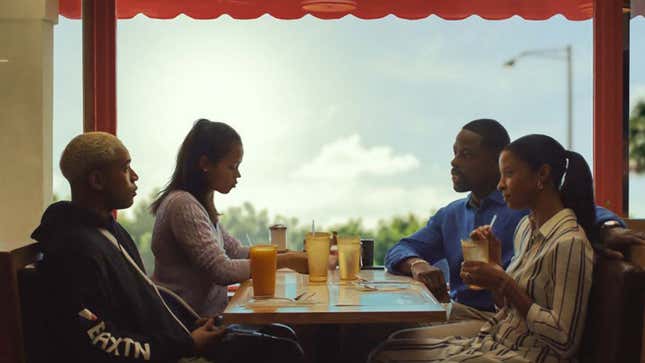
Let no one fault Trey Edward Shults for giving less than 110%. His third feature, Waves, confers the impression of a rising independent harnessing the confidence of youth to take his shot at a masterpiece. Shults wants to do his Boogie Nights, with the off-the-wall camerawork and big-ticket needle-drops and soul-deep emotionality that the comparison implies. Each scene feels like it could be the climax of its own movie, starting at a fever pitch and building in intensity from there. That grim feeling known to wash over ticket-buyers as they walk out of the multiplex, seized by the impression that everyone involved in the production took the path of least resistance, will not be an issue for viewers of Shults’ latest. His goals are nothing short of a life-affirming, generation-defining landmark tying together mortality and family and race in America. Believe it or not, this turns out to be easier said than done.
Both in conception and realization, Shults makes a handful of crucial miscalculations that result in his atlantean efforts going awry. As a film about Blackness authored by a white man, as a film about grief authored by an artist with no tonal throttle, as a film about the salvational potential of the home authored by a director whose first triumph made that space out to be a claustrophobic nightmare, it’s all a disastrous mismatching of subject matter to the talent that Shults has already demonstrated. Judging from the tender scene in which one character baptismally cradles their loved one in the Floridian waters, Shults would like to be Barry Jenkins, but he was getting pretty good at being himself.
The good news is that the director’s ambitions, no matter how inadvisable, have attracted a strong cast and occasioned some of their best work. The nuclear family unit gets put through its paces by the Williams clan, seemingly an image of African-American success with their spacious McMansion and booming construction business. But son Tyler (Kelvin Harrison Jr.) has a rage problem and shoulder ailment that threaten both his fledgling wrestling career as well as his relationship to paterfamilias Ronald (Sterling K. Brown, best of the bunch). The fault lines separating them, Tyler’s sister Emily (Taylor Russell), and their stepmother Catharine (Renée Elise Goldsberry) begin to crack into interpersonal fissures after Tyler impregnates his girlfriend Alexis (Alexa Demie, playing the exact same character as she does on Euphoria, and inhabiting the type just as perfectly). When she decides not to get the abortion, a sequence that will have audiences pining for the measured delicacy of Juno, he reacts with characteristic, impulsive violence.
This turning-point event triggers a complete formal changeover, as Shults trades methods from all-out maximalism to a stiller and more subdued register. Both halves of the film share a wall-to-wall soundtrack presumably intended to communicate that its curator regularly read Pitchfork in 2013: There’s Tame Impala, not one but two Animal Collective tracks, a whole lotta Frank Ocean, and a conception of hip-hop limited to Tyler The Creator, A$AP Rocky, Yeezus-era Kanye, and Good Kid-era Kendrick. While the stationary long takes that depict Emily’s intimate courtship with lovable, awkward Luke (Lucas Hedges) in the latter half may be preferable to the former’s ceaseless lurching and sonically assaultive noise courtesy of scorers Trent Reznor and Atticus Ross, both suffer from a belabored screenplay.
Shults can scarcely script a conversation between the parents and their children that’s not about such tritenesses as “working twice as hard to get half as far,” or other double-underlined pronouncements taking the place of the naturalistic household patter of his Krisha. He can’t write an argument between Tyler and Alexis that doesn’t devolve into banal text messaging—which, fine, them’s the teens—or veiny-necked bellowing straight out of an MTV reality show. He allows Emily and Luke the luxury of talking about nothing, and gets some of the most affecting footage for it. A frolic in the soft Everglade waters with a friendly manatee warms the insides, the rare instance of the film achieving the visceral response for which each sequence has been ruthlessly calibrated.

The more skeptical armchair cultural critics among us may perceive in Shults’ selected reference points, Instagram-filter cinematography, and overall commitment to being emo as an attempt to pander to a hipper set of Gen-Z content consumers, or the Tumblr alumni fixated on their culture. In the months since this picture first debuted at Telluride and Toronto’s film festivals, individual reception seems to have been determined by one’s placement on the sliding scale from cynicism to sincerity. Those receptive to the open-vein sentimentality can see Shults’ leaden-handed commentary on Black identity as fundamentally well-intended, even successful; those less favorable will detect a filmmaker’s manipulative attempt to score pathos on the gravity of a struggle that does not belong to him. He deserves recognition if for no other reason than having delivered a film impossible to feel indifferent about.
But there are dead giveaways that place Shults’ handiwork on the less charitable side of the divide. The ratio of the Williams’ time spent suffering to not-suffering, for instance, suggests that their creator mainly values them (and their Blackness) for the pain. The camera’s blocking during the pivotal scene has been choreographed to wring every last drop of shock out of its moment, distastefully lingering on the unspeakable. Shults has amply proven himself a stylist of estimable powers, and the sheer centrifugal force of the first hour confirms that he can make an overwhelming sensory experience out of pretty much anything. Still, the onus remains to use these powers for good, and not for something that considers yelling the chorus to “Backseat Freestyle” at a boozy bonfire to be a tactful depiction of adolescent alienation.